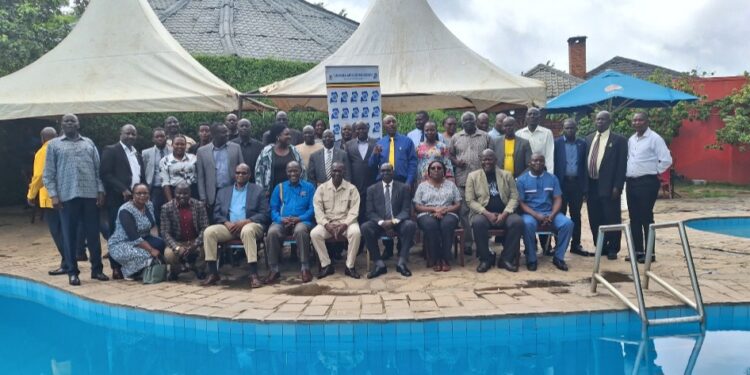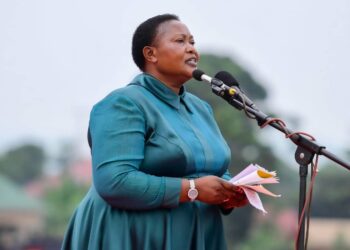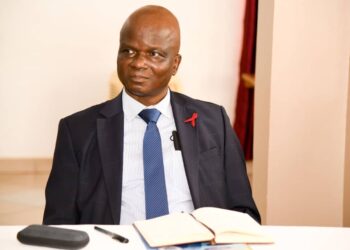The Senior Presidential Advisor-Research, Dr. Dan Ssekiboobo has commended the Resident District Commissioners (RDCs), Resident City Commissioners (RCCs) and their deputies in West Nile for reducing land evictions in the sub-region.
“As a result of your vigilance in land-related matters, the rampant and brutal evictions that were the order of the day have now reduced or generally been stopped,” he said.
Dr. Ssekiboobo made the remarks yesterday while representing the Minister for Presidency, Hon. Babirye Milly Babalanda during the closure of a three-day capacity building workshop for RDCs, RCCs, their deputies, RISO and DISOs in West Nile held at White Castle Hotel, Arua City.
The Senior Presidential Advisor also lauded the commissioners for their strong fight against corruption. He said RDCs and RCCs are now recovering stolen public funds from corrupt civil servants.
“Even Emyooga and other government loans are being recovered. There are also declining incidences of sub-standard works of local government infrastructure projects due to your vigilance to supervise and even arrest the corrupt civil servants and contractors,” Dr. Ssekiboobo noted.
Dr. Ssekiboobo further expressed gratitude to the commissioners for their great effort in representing the government.
“We continue to witness many of you ably speaking on behalf of the government and addressing the public on key issues with the authority and power of your office.”
Dr. Ssekiboobo however highlighted some of the challenges that have continued to bedevil the Office of the RDC/RCC that need to be worked upon.
“If RDCs/RCCs or deputies have issues please report these to the Presidency before even involving the police. You have a whole long chain of “shock absorbers” in the form of the Minister for the Presidency, the Secretary Office of the President, the Head of RDC Secretariat, regional Commissioners, regional whips, RDC Dean and the Principal Human Resource Officer,” he said.
The former Minister of Lands, Housing and Urban Development, Hon. Daudi Migereko urged the participants to engage refugees in the area , if they want to preserve security in the sub-region.
“You have a challenge of Refugees from DRC and South Sudan.Engage these refugees so that they don’t cause insecurity in the area. It’s your duty together with other offices to ensure that they live a meaningful life. You make them redundant, they will cause insecurity and the local people will become disgruntled and that will be a problem,” he said.
Hon. Migereko also appealed to the commissioners to ensure that they carry out mobilisation because it is very crucial in helping them to fulfil their mandate.
He said if they succeed in mobilisation, their work as RDCs will be simplified.
“We must make sure that we carry everybody on board so that our work is understood and effectively pursued. Mobilisation is a continuous process and in your office, it is something you continuously deal with so that you can effectively do your work,” Hon. Migereko noted.
“If you succeed in this, your work will be made very easy. If you fail, people will lose trust in you and you will be in trouble because it will affect everything you are supposed to do.”
The former Energy Minister further explained that peace and security are an important aspect in mobilisation and that RDCs should not take them for granted as they go about their duties.
“Every day you must work to ensure that peace and security is preserved in your area to ensure tranquillity. For the area to have peace and security, there’s someone working day and night,” he said.
“It’s not accidental that RDCs are the heads of security in their areas of jurisdiction. If you relax and sleep on the job you will see criminality coming back. You don’t want to see such a thing happening in your area. Never take any security report for guaranteed, anything to do with security, call for a meeting and see what to do. Your first area of mobilisation should be in regard with peace and security,” he added.
Hon. Migereko also raised the challenge of idle youth in the sub-region, calling upon the commissioners to have a plan for them so that they don’t disrupt the existing peace and security in the area.
“What is your plan for these young people because if you don’t have a plan they will disrupt peace and security in the area.”
He also advised the commissioners to take advantage of Local Council structures in order to deal with criminality in their areas of jurisdiction.
“These crimes are organised and are carried out from the villages. The chairpersons and councillors are your listening ears,you have to work with them. If you don’t want criminality in your area, you must start from the villages. Take interest in utilising the LC structures they will make your work very easy,” he emphasised.
On the other hand, Hon. Migereko informed the participants that an area can never have total peace and security, if they don’t address the issue of economic empowerment.
“Socio-economic transformation is a critical issue. Someone may not have the DNA for a criminal or a rebel but if he doesn’t have anything to eat, money to pay for rent, school fees, clothing, circumstances will force him to become a problem in the society,” he said.
“Parish Development Model (PDM) is everywhere in the country. Your area should register success. The Emyooga is being talked about by the President and other leaders every day.”
He also urged the commissioners to take advantage of the media for mass mobilisation.
“The world we are living in believes in publicity. Everyday think about what you are going to do to create an impact. Don’t close yourself out. Read the newspaper, listen to radios, go to those media houses and talk but don’t talk about things that you have not researched about,” Hon. Migereko said.
“Cadre identification and development is also important. We are what we are because some people identified us. Your mobilisation requires disciples by reaching out to people, identifying them and empowering them. They will help you in mobilisation.”
The head of Special Programs at Uganda AIDS Commission (UAC), Ms. Lilian Tatwebwa who represented the Director General of the commission, Dr. Nelson Musoba, discussed the status of HIV/AIDS in Uganda.
She advised the participants that they should sensitise the masses to ensure that they end the current new infections of 52,000 annually if Uganda is to end HIV infections by 2030.
“For us to reach our target in 2030, there are some gaps we need to address. The infections are high because people don’t know their HIV status,” Ms. Tatwebwa said.
“You should mobilise communities to fight negative social cultural practices such as child marriages, gender based violence, alcohol and drug abuse and other behaviours that expose people to the risk of HIV,” she added.
Do you have a story in your community or an opinion to share with us: Email us at editorial@watchdoguganda.com












